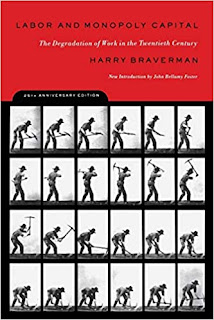Summary of Chapter 1: Labor and Labor Power
Braverman rehearses the basic Marxist theory of labor and labor power, with some special points he will use to set up his own argument and thesis. One point he stresses is human exceptionalism: human labor is different because it is "intelligent and purposive," independent of instinct, and also affected by the transmission of culture through language (this opens it up to the influence of the social relations of production, in a manner presumably less significant for a chimpanzee using a stick to dig termites (though that is also culturally transmissible, the point is that humans have a whole apparatus and are much more dependent on this transmission). The intelligent aspect of human labor means it is in a sense inalienable from the worker in the way that the labor of an animal is not [his argument here is not quite convincing; in reality it does not matter to his point whether the labor of animals is or is not alienable. He insists on the difference in order to highlight the role of intelligence and innovation]. Basically the intelligent aspect of human labor not only enables exploitation but sets up exploitation and the labor process involving exploitation, as a struggle over the control of labor (this is my inference from his writing).
Human labor, on the other hand, because it is informed and directed by an understanding which has been socially and culturally developed, is capable of a vast range of productive activities. The active labor processes which reside in potential in the labor power of humans are so diverse as to type, manner of performance, etc., that for all practical purposes they may be said to be infinite, all the more so as new modes of labor can easily be invented more rapidly than they can be exploited. The capitalist finds in this infinitely malleable character of human labor the essential resource for the expansion of his capital. (38)
[Significantly, this is almost precisely the distinction Norbert Wiener makes between simple and more complex automata, and which comes to fruition with the computer as an open-ended technology. I imagine this is not a relationship which Braverman is foreseeing in writing this (though he is writing twenty years after Wiener). The simple to complex argument – more specifically, the openness and malleableness of machines for manifold programmable uses, being distinct from simple one-purpose machines – is actually much stronger for Wiener than for Braverman's attempt to distinguish humans from other animals. Arguably, Braverman's human exceptionalism might justifiably be sacrificed to avoid the comparison. But on the other hand, the comparison is significant, and what Braverman emphasizes as the important quality of human labor under capitalism, is just what the multi-purpose machines are designed to replicate]
He turns to the issue of labor power, and the historical conditions which bring about industrial capitalism and a large class of workers who must sell their labor power. He notes that this is in fact a recent historical condition, using statistics of self-employment in US history, from 19th into 20th centuries. He notes the [paradox] of labor power, that it is infinite in possibility and finite in realization; this malleable potential is part of what is struggled over and why capitalists must prefer fixed capital inputs over human labor. He ends the chapter with a thesis statement regarding the historical emergence of the struggle over the labor process and the need of the capitalist to take more and more control from the worker: thus is the "problem of management" born.

No comments:
Post a Comment